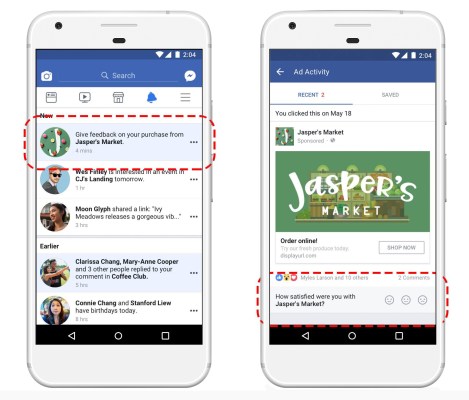Facebook is cracking down on shopping sites and others that bait and switch customers by delivering lower quality products than what they advertised on the social network. Today, Facebook launches a new e-commerce review option inside its “Recent Ads Activity” dashboard that lets buyers give feedback about slow shipping times, weird smells, and junky merchandise.
Users are able to access the ads that they have clicked, and provide feedback, by clicking on their Ads Activity, where they can also provide feedback on any ad they may have intentionally or unintentionally clicked on. Now, those responses will be tailored when they are related to ads that have resulted in a purchase, and they will also get fed back to advertisers as well as Facebook itself. Facebook is also expanding feedback options to more areas for those who have purchased items on the back of ads: for example, with prompts in their notifications.
There appear to be two aims to the new feedback option. On the more optimistic side, for those advertisers who are selling but not managing customers’ expectations well enough, they are able to get more information to modify their practices. On the more practical (and pessimistic) side, if a business receives a critical mass of bad feedback, Facebook will notify them with an ultimatum to improve. If they don’t, Facebook will refuse to run their ads.
Facebook’s efforts as an e-commerce platform are relatively young: it was only last week that it launched a way for those posting items in its community-focused Marketplace to advertise them also in the News Feed; and in May it expanded its Craigslist competitor also to include home services professionals. So, to make sure that its e-commerce advertising doesn’t die on the vine, it has to boost trust, or else its 2.2 billion users might stop clicking its shopping ads for fear of getting burned.
“We’ve all had negative customer experiences with businesses,” Sarah Epps, product marketing director for Facebook, said in an interview. “Sometimes they’re hard to reach, late shipping items, or ship you low quality goods. What we hear from people is that bad shopping experiences cost them money and are really inconvenient. They’re bad for people, bad for good businesses on Facebook, and they’re bad for Facebook.”
There is another reason for making the experience better for both users and advertisers: there has been research that indicates that some companies, which have grown entire businesses on the back of selling items via Facebook ads, are now looking for alternative platforms after the ads started to become too expensive.
While policing the claims of every sketchy e-commerce vendor would be impossible, it can at least use negative reviews to choke off their traffic and absolve itself of profiting off their scams. Today’s announcement is a start to balancing reliability with avoiding censorship or unscalable enforcement.
In that regard, it’s similar to the approach that Facebook has been taking with regards to offensive posts and outright fake news: rather than expecting or hoping that its algorithm can identify everything accurately, it’s also trying out upvotes and downvotes on comments, and currently works with third parties to fact check and flag news.
Facebook’s move to let users’ experiences shape how advertisers sell products — and in the worst cases whether they sell them at all — stems from two years back, when BuzzFeed first brought to light an ongoing issue among those who were clicking on Facebook ads for merchandise — specifically clothes — and getting products that were far from what they expected.
Facebook says that it’s taken two years to roll this out because of the nature of how things are purchased off the back of ads on Facebook.
Facebook was exploring this issue before it was surfaced by the press, from what we understand. The biggest challenge is that the activity was happening off Facebook and the company has limited ability to understand what a user does once she or he leaves Facebook from an ad. So it took time to develop a feedback mechanism to solve the problem, and make sure it was fair to all parties.
The company already had policies in place that prohibit things like online scams, publishing ads with text that misrepresent products, and Facebook had already been proactive in enforcing against landing pages that do not represent an ad.
What’s important to note here is that this is not a slam-dunk, where banning advertisers or certain ads from Facebook is the inevitable outcome. Facebook says that it’s just as likely that advertisers are making bad choices in how they present or run their businesses; not that they are intentionally misleading people. A bulk of the ads originally identified by BuzzFeed were found to be coming from companies out of China, pointing both to logistical and language challenges, among other issues.
“We give businesses time to act on the feedback,” said Epps. “Of the hundreds of the businesses we’ve shared negative feedback with so far, many have taken steps to change. If they don’t show improvement over time, their ads won’t deliver to people’s news feeds. The reaction from businesses has been positive so far. That’s been surprising for us. There are some bad actors out there to scam people, but [most businesses do want to offer a good experience].”
Updated with more comment from Facebook
